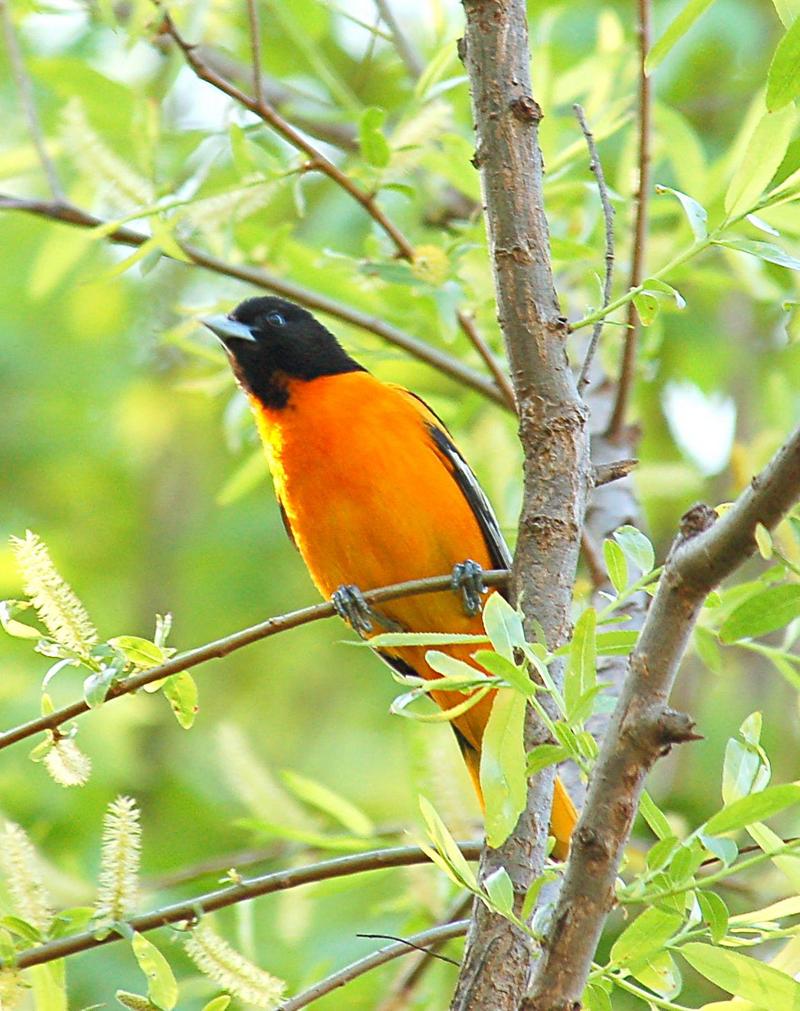|
| 질의: Icterus bonana | 결과: 4번째/4 | |
New World Oriole (Family: Icteridae, Genus: Icterus) - Wiki
| 제목: | New World Oriole (Family: Icteridae, Genus: Icterus) - Wiki
| |

| 해상도: 1158x1464
파일크기: 247160 Bytes
촬영일: 2007:05:04 03:51:02
사진기: NIKON D50 (NIKON CORPORATION)
F number: f/5.7
Exposure: 10/2000 sec
Focal Length: 4000/10
등록시간: 2007:09:27 03:30:28
|
New World oriole
From Wikipedia, the free encyclopedia
[Photo] Baltimore Oriole, Icterus galbula. Adult male, underside. Photo by Joby Joseph (http://en.wikipedia.org/wiki/User:Badjoby). Photographed using Nikon D50 at Rockville, MD, USA. Date: 4 May 2007
The genus Icterus, New World orioles, is a group of birds in the Icteridae family. They are not related to the Old World orioles which are in the family Oriolidae, but are superficially strikingly similar in size, diet, behaviour and their yellow-and-black plumage, a good example of convergent evolution, and almost inevitably took the same vernacular name.
The males are typically black and yellow or orange, with white markings; the plumage of females and immature birds is duller. These birds go through one moult in a year. They are generally slender with long tails and a pointed bill. They mainly eat insects, often also nectar and fruit. The nest is a woven pouch. Several species are easy to attract to birdtables by the provision of cut oranges and grape jelly, both are favored by orioles. The species nesting in areas with cold winters (including most of the United States) are strongly migratory, while subtropical and tropical species are more sedentary.
The name "oriole" was first recorded (in the Latin form oriolus) by Albertus Magnus in about 1250, and was stated by him to be onomatopoeic, from the song of the European Golden Oriole.
The genus name Icterus is from the Greek word for yellow and is also associated with jaundice.
The following is a provisional species list, not incorporating recent revision. The exact delimitation of several species is unclear, and hybridization seems to be a significant confounding factor, for example in the Baltimore and Bullock's Oriole:
Moriche Oriole, Icterus chrysocephalus
Epaulet Oriole, Icterus cayanensis
Yellow-backed Oriole, Icterus chrysater
Yellow Oriole, Icterus nigrogularis
Jamaican Oriole, Icterus leucopteryx
- Grand Cayman Oriole, Icterus leucopteryx bairdi - extinct (mid-20th century)
Orange Oriole, Icterus auratus
Yellow-tailed Oriole, Icterus mesomelas
Orange-crowned Oriole, Icterus auricapillus
White-edged Oriole, Icterus graceannae
Spot-breasted Oriole, Icterus pectoralis
Altamira Oriole, Icterus gularis
Streak-backed Oriole, Icterus pustulatus
Bullock's Oriole, Icterus bullockii
Hooded Oriole, Icterus cucullatus
Troupial, Icterus icterus
Baltimore Oriole, Icterus galbula
Black-backed Oriole, Icterus abeillei
Orchard Oriole, Icterus spurius
Fuertes's Oriole, Icterus (spurius) fuertesi
Black-cowled Oriole, Icterus prosthemelas
Greater Antillean Oriole, Icterus dominicensis
Black-vented Oriole, Icterus wagleri
St. Lucia Oriole, Icterus laudabilis
Martinique Oriole, Icterus bonana
Montserrat Oriole, Icterus oberi
Audubon's Oriole, Icterus graduacauda
Bar-winged Oriole, Icterus maculialatus
Scott's Oriole, Icterus parisorum
http://en.wikipedia.org/wiki/New_World_oriole
| The text in this page is based on the copyrighted Wikipedia article shown in above URL. It is used under the GNU Free Documentation License. You may redistribute it, verbatim or modified, providing that you comply with the terms of the GFDL. |
|
댓글 |
|---|
| | 손님 |
|
Baltimore Oriole (Icterus galbula)
French: Oriole de Baltimore German: Baltimoretrupial Spanish: Turpial de Baltimore
Other common names: Northern Oriole (when treated as conspecific with I. bullockii)
Taxonomy: C.[oracias] Galbula Linnaeus, 1758, America = Virginia, USA.
DNA data indicate that this is sister-species of I. abeillei. Formerly treated as conspecific with latter and with I. bullockii; hybridizes extensively with I. bullockii in a belt from S Canada (Alberta and Saskatchewan) S in Great Plains to S USA (Oklahoma and Texas), but assortative mating (or selection against hybrids) evident at several locations. Monotypic.
Distribution:
Breeds in S Canada from NE British Columbia and Alberta E to S Ontario, S Quebec and Nova Scotia, S in C & E USA to C Texas, C Mississippi, NW Georgia, W Virginia and N Delaware; winters mostly in Florida, coastal California, Cuba and Jamaica, and Mexico S to N Colombia and Venezuela. |
^o^
동물그림창고 똑똑전화 누리집
^o^
|
|
|

